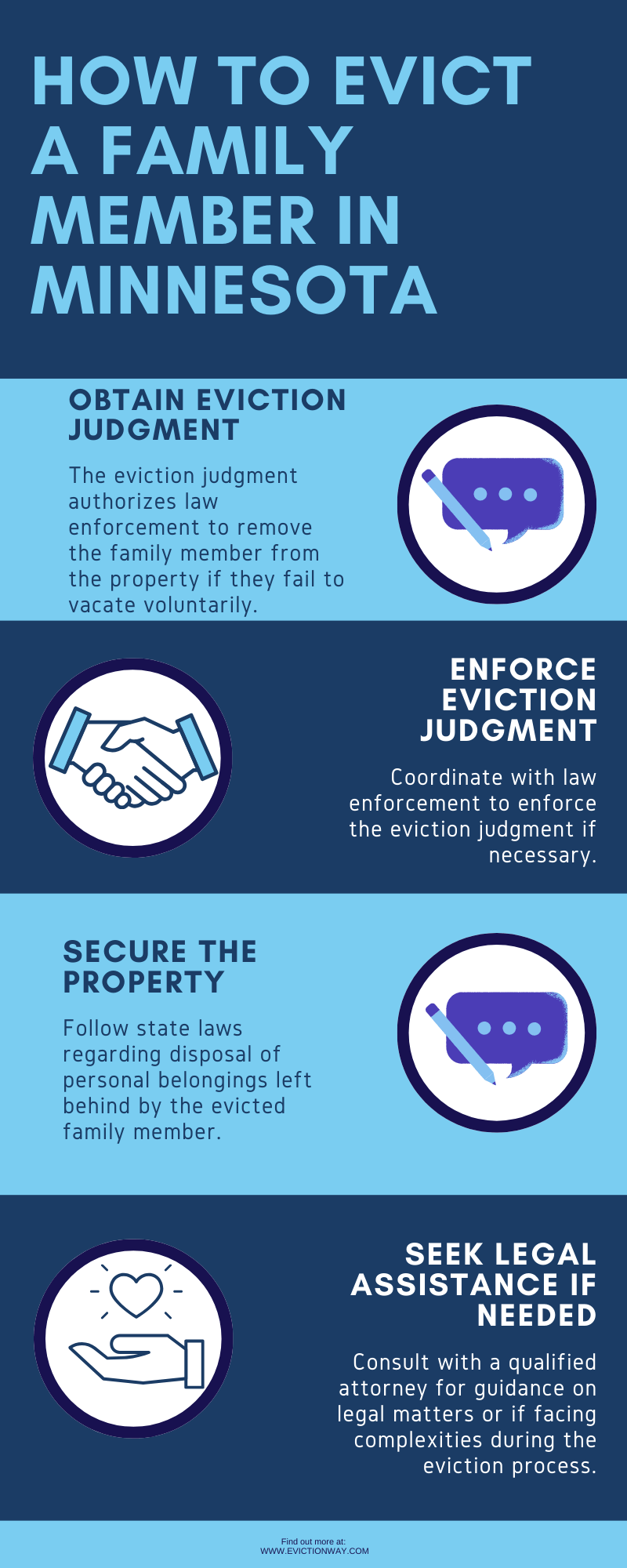Evicting a family member can be a challenging and emotionally draining experience. If you’re facing this situation in Minnesota, it’s crucial to understand the legal process and your options. In this blog, we’ll guide you through the steps involved in evicting a family member in Minnesota, providing practical advice and legal tips to help you navigate this difficult time.
To evict a family member in Minnesota, you’ll need to follow specific legal procedures. We’ll explain the process step-by-step, including how to serve an eviction notice, file a complaint with the court, and obtain a judgment for possession.

We’ll provide guidance on communicating your decision to your family member, setting clear boundaries, and seeking support from professionals if needed. By understanding the legal framework and following our practical advice, you can navigate this challenging situation with greater confidence and minimize the emotional toll it takes on you and your family.
How To Evict a Family Member In Minnesota
Evicting a family member can be a difficult and emotional process. However, it is important to remember that you have the right to protect your property and your family. If you are considering evicting a family member, it is important to follow the proper legal procedures.
1. Give Notice
The first step in evicting a family member is to give them written notice. The notice must state the reason for the eviction and the date by which they must vacate the property. The notice must be served in person or by certified mail.
2. File a Complaint
If the family member does not vacate the property by the date specified in the notice, you will need to file a complaint with the court. The complaint must state the facts of the case and the relief you are seeking.

3. Attend a Hearing
Once you have filed a complaint, the court will schedule a hearing. At the hearing, you will have the opportunity to present your case and the family member will have the opportunity to present their defense.
4. Obtain a Judgment
If the court finds in your favor, you will be granted a judgment of eviction. The judgment will order the family member to vacate the property within a certain period of time.
5. Enforce the Judgment
If the family member does not vacate the property by the date specified in the judgment, you will need to enforce the judgment. This can be done by contacting the sheriff’s office and having them remove the family member from the property.
6. Seek Legal Help
Evicting a family member can be a complex and challenging process. It is important to seek legal help if you are considering evicting a family member. An attorney can help you understand your rights and protect your interests.
How Much Does it Cost to Evict a Family Member in Minnesota?
The cost of evicting a family member in Minnesota can vary depending on several factors, including the county in which you live, the complexity of the case, and whether you hire an attorney.
| Action | Approximate Cost (District Court) |
| Filing fee | $285 |
| Service of court | Varies by county |
| Issuance of writ of recovery | $55 |
| Notice of Appeal filing fee | $550 |
| Legal fees | $500-$10,000 |
| Average locksmith fees | $160 |
| Tenant turnover costs | Varies |

FAQs: Evicting a Family Member in Minnesota
Here are some of the most frequently asked questions about evicting a family member in the Minnesota:
1. What are the legal grounds for evicting a family member in Minnesota?
In Minnesota, you can evict a family member if they have violated the terms of their tenancy, such as not paying rent or breaking the lease agreement. You can also evict a family member if they are causing a nuisance or disturbance to other tenants or neighbors.
2. What is the process for evicting a family member in Minnesota?
To evict a family member in Minnesota, you must first give them a written notice to vacate. The notice must state the reason for the eviction and the date by which the family member must leave. If the family member does not leave by the deadline, you can file an eviction lawsuit with the court.
3. Can I evict a family member if they are not on the lease?
Yes, you can evict a family member even if they are not on the lease. However, you must be able to prove that the family member has been living in the property with your permission and that they have violated the terms of their tenancy.

4. What are some common defenses to eviction in Minnesota?
Some common defenses to eviction in Minnesota include:
- The tenant did not violate the terms of their tenancy.
- The landlord did not give the tenant proper notice to vacate.
- The eviction is retaliatory.
- The tenant has a disability that makes it difficult for them to find other housing.
5. What should I do if I am being evicted from my home by a family member?
If you are being evicted from your home by a family member, you should contact a lawyer immediately. A lawyer can help you understand your rights and options, and can represent you in court if necessary.
Related:
